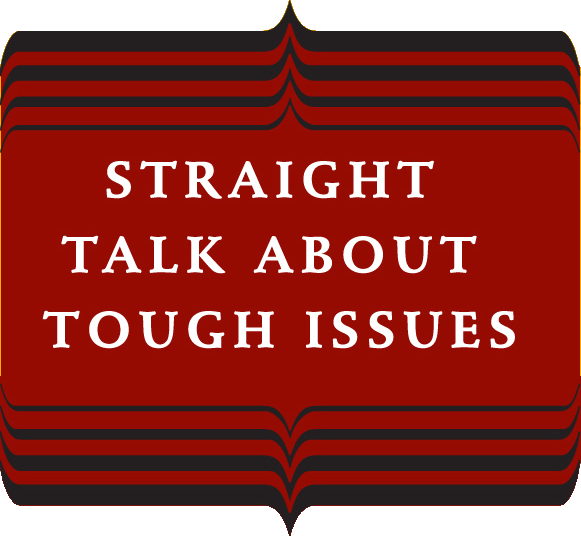A few years ago, during a talk I gave about gender issues in the workplace, a guy in the audience asked me how he could communicate to his female colleagues that he was on their side. He said because he was an older white man, they always assumed he was a chauvinist. I asked him if he was looking for something like a password or a secret handshake. “Yeah!” he said enthusiastically.
I told him to keep on doing the right thing, and his co-workers would catch on. The advice felt a little lame, even at the time. Now it feels really lame. Recently, a new entrepreneur asked me what he could do to make sure that he was developing a company that would be friendly to women. This time I was prepared with a lot more specifics.
First, let’s applaud these guys. They are exceptionally good guys, not just tolerant of women but openly supportive of them. We’ve been hearing so much about bad guys that we have forgotten how many decent, respectful gentlemen there are out there. I’m alarmed that we have fallen into what Dave Barry calls the “national consensus that all men are pond scum with hands.”
Next, let’s acknowledge that 2017 was a watershed year for recognizing the extent and viciousness of sexual misconduct in the workplace. It has been truly horrific to hear some of the women’s stories. However, with emotions running so high, we run the risk of throwing someone to the wolves for a fairly minor infraction. Just as there is a difference between stealing paperclips and embezzling millions, so there is between an inappropriate joke and sexual assault. However, over the past year, there has been so much vitriol spewed that any reasonable man would be wondering if he really knows what is acceptable behavior in the workplace.
In case you are that man, and in an attempt to simplify a complicated topic, I’ll start with some basic rules that will help you lay a foundation to engage productively and positively with your female co-workers.
1. Female colleagues do not represent a romantic prospect—ever.
No way, no how. Colleagues are off limits. I am inflexible on this point because I have seen how much damage sex between employees can wreak, for the parties involved, their co-workers, and the company. Invariably, even when the relationship survives, one party is wounded professionally, and one or both end up leaving. Understanding Rule #1 solves a lot of problems right up front. No flirting, no innuendo, no dating, no hookups. All interactions, either at the workplace or off-site, work related or social, are strictly platonic and professional.
That’s fine, I can hear you complain, but what if she starts flirting with me? Clearly, she needs to read my first book, The Discreet Guide for Executive Women, but until that happens, here’s what you have to do. Shut that down. Just because she makes an overture doesn’t make it okay. You have to be the grown-up here and bring your interactions back to a professional level. Don’t try to blame her for something you did wrong. If she persists, blame me—tell her you read an article about how you can’t date women at work, not a single one, no matter how hot she is.
I get that this advice might clash with how you behave with women outside of work. I also get that it might disappoint your buddies and other (ahem) drives. Too bad. Different rules apply at the workplace. Get your kicks someplace else. It will save you a lot of pain and agony in the long run. You’re welcome.
2. Listen to her and take her seriously.
The most common complaint from my female clients is that they aren’t listened to at work. Some of that might be on them. Sometimes women don’t make their arguments well, aren’t persistent enough, or don’t speak up at. However, there are too many workplaces in which women are routinely ignored. Be sure to make room for your female colleague in a discussion, especially when she is raising a point that is in conflict with the consensus—that is a very dangerous position for her professionally, and she may need some encouragement to stand her ground. Remember that many women have been socialized to go along and not make waves.
At times, it may be appropriate to call on a woman in a meeting if she hasn’t spoken up. You can do so in such a way as to convey that her input is valued. Be polite and consider her comments thoughtfully. If you make it safe for her speak, she is more likely to take the initiative in the future. Diversity is most valuable when everyone speaks and everyone listens.
3. Check yourself for sexism.
We have all been socialized to expect certain behaviors from men and other behaviors from women. When employees display behaviors that run contrary to our expectations, we may find them unattractive or even unacceptable.
At work, in order to be successful as a contributing member of a team, a woman must display behaviors that are more associated with men than women. She must express herself in clear and emphatic tones. She must be decisive. And she has to make hard decisions that may offend some male egos. For this, she may be harshly viewed, by both her male and female colleagues. In certain workplaces, assertive, self-assured, high performing women are roundly criticized.
In a study of 248 performance appraisals, linguist Kieran Snyder discovered that women received much more frequent critical feedback than men did, 88 percent compared to 59 percent, and that the feedback was often less constructive and more personal. In fact, thirteen women were reprimanded for being “abrasive,” a word that showed up in none of the men’s reviews.
When you have a negative reaction to a woman’s behavior at work, take a step back and consider if her behavior would be unacceptable if she were a man. If no, your reaction may reveal some subtle gender bias on your part. This is especially important during the hiring process and on performance evaluations. Strong female performers will rub some people the wrong way. You don’t want to lose good candidates and employees because of someone’s outdated view of how women should behave.
4. Use humor with caution.
Think you’re funny? Think again. Your female colleagues might not agree. Humor is a wonderful tool in the workplace, but not when it makes women uncomfortable. I think some women should loosen up and not be so easily offended, but sometimes they are picking up on an undercurrent of ridicule or misogyny or resentment that has no place in the workplace.
Some of the stories I’ve heard are so bad that I wrote an article specifically to help women deal with inappropriate workplace humor. Consider the poor woman whose co-worker threw dollar bills at her in appreciation of her attractiveness. She was appalled, but I suspect he didn’t realize how insensitive his action was (see Rule #1). He thought he was being funny.
Humor is complicated enough that I composed The Five Golden Rules about workplace humor. To summarize, jokes about women are mostly not funny, and guys who tell such jokes often have a nasty agenda. Jokes about specific men and women can be funny, but you are treading on dangerous ground. These days, women are on such red hot alert, I’d avoid using gender-related humor and focus on jokes that everyone can get a kick out of. You can find some good ones here.
5. Watch it with the touchy-feely.
It is amazing how many complaints there are about men touching women at work. Is it really that hard to keep hands off? No, it’s not, and men are sometimes sending a proprietary and disrespectful message about women’s bodies when they engage in casual touching. It would be easy to say, just never touch her, but sometimes it is natural and kind to touch someone’s arm, or give them a hug, or put your arm around someone. But it shouldn’t be frequent and it shouldn’t be icky.
Also don’t be stupid. If someone tells you not to touch her or shrugs your hand off, pay attention. You’re making her uncomfortable. Some men are too clueless to consider the possibility that women don’t enjoy their touch, but, of course, that isn’t you.
6. Don’t call her out on her gender.
Another common mistake I see is that men will call attention to a woman’s gender, sometimes innocently, but still for no good reason. I recognize that men are often acutely aware of a female presence, but you’re better off to set that aside. Don’t ask for a woman’s perspective or ask her to coach another woman or imply that she could do more with a male client than you could. Don’t ask her to do anything you wouldn’t ask a guy to do. You’re pointing out that she’s different, and maybe not in a good way.
Sometimes, the intention is innocent, but I would ask, why even go there? Here’s an example: a man approaches a group of women sitting together in the corporate lunchroom and calls out “Hello, beautiful ladies!” This isn’t a crime, but why would you do it? The women might feel slightly flattered, though probably not. They are more likely to be uncomfortable or irritated that the guy is drawing attention to the fact they are all female. It’s irrelevant. How much better it would be to say, “Hello everyone!” or calling them each by their name. Remember that each time you make an issue of someone’s gender, it drives a wedge among us and can make women feel unwelcome.
7. Step up for women!
I’ve saved the best for last. When you see someone being mistreated, object immediately and publicly. If more men were to speak up for women, we would see a dramatic decline in the maltreatment of women at work. When you say nothing, you are implicitly approving of what’s happening. In order to shift the culture, you guys have to take action. Your intervention is incredibly powerful.
I once joined a company that harbored a sexual predator. Although we had proof of his terrible behavior, I believe we would not have been able to bring him down if several of his male subordinates had not been brave enough to step forward. It was not until they attested to a pattern of repugnant behavior that the company developed the backbone to take action.
There’s more to say about this complicated topic, but these rules will get you started and give you some food for thought. As someone who has devoted considerable effort to improving gender relations, I am dismayed by the apparent worsening of the battle between the sexes over the past year. However, despite the large amount of ink that has been spilled, men and women can work productively together, really enjoy each other’s company, and develop collegial relationships that last a lifetime. I hope that after reading this article, you feel more comfortable interacting with women at work and more confident in your ability to build strong relationships with them. Let me know how it goes.
© 2018 Jennifer K. Crittenden





 Ten 90-minute individualized sessions. Private and confidential.
Ten 90-minute individualized sessions. Private and confidential.


Chad Bryan
/ June 6, 2023I am a 47 year old white male who started a new sales job with a female manager 45. and 2 female coworkers in sales 30 and 34. This is the first time in my career I have ever been treated as the enemy by any female. Both of the younger females are offended by everything I say. I have noticed that they choose to be on the opposite side of every subject that comes up. In contrast the manager an I are in complete agreement on everything. The two coworkers think I am judgmental and racist and can not see the irony In their judgment of me. Btw I’m also a gay man and I have been high sales for 5 months in a row. They have tried everything they can to have me fired even complaining to HR. Nothing has been seen as grounds for even discipline but at what point will their actions be seen as harassment?
jeff
/ June 7, 2023Hi Chad, I am very sorry to hear about your experience. It is sad to hear that the current atmosphere as led to open season on white males, particularly by confused young women. Your comment about “not seeing the irony” is spot on. It sounds as though logic and reasonableness have won out (so far), and I hope it stays that way. I can only advise you to keep to the high road and hope for better days, but that’s easy for me to say. With regards to your question, I think it will be a cold day in hell before legal protections are offered for white males, but I hope that your manager will begin coaching the younger women about respectful and courteous treatment of all co-workers. It is up to her to maintain an environment conducive to collaborative teamwork. Good luck and fingers crossed that this phase will pass quickly.
eli
/ July 16, 2023I myself have been in a situation with just me being the only male worker and the other 4 workers in the office being female workers with the manager being female ;
things were initially evasive with them at first with them avoiding me in the breakroom and keeping conversation to a very minimum except one of the ladies who was 46 I am 38 but the other 3 were all in their 20’s ; the 46 yr old had the best social conversational skills while the other 3 it was very hard to connect with them on anything , I consider myself ok at making and holding conversation.
So fast foward 7 months on the job I believe the manager did warm up to me after she found out I had a GF the whole time and we would talk about gaming (my manager has big into gaming ) and so was I and she liked horror movies which I did as well so over time I won her over and we had a good relationship at work she was 28 the other two were 22 and 24 but I could never relate much to them and our relationship stayed mostly the same even when they found out I was dating someone ; I never tried to flirt with any of them and tried to talk about weather, how the weekend went, things at work , life and other topics but I could only really level with two of the four co workers; I am a Mexican male with light skin if that helps
jeff
/ August 4, 2023Hi, thank you for relaying your experience. I’m glad you were able to establish a relationship with two of the four—does that count as batting .500? I’m only slightly joking because I think right now there is so much suspicion of male colleagues that, like baseball, .500 might be a pretty good average. I’m disappointed that the two younger colleagues were unfriendly. It’s such a shame, but sadly, as I say, there are a lot of preconceived notions and suspicions directed at men in the workplace. I hope that changes over time. Thank you for trying. That’s about all you can do in that situation.
Anonymous
/ August 10, 2023As a woman I would like to point out that over time woman have succeeded in establishing themselves in the workplace. In some fields they outnumber men. Which means that the number of women is equal or greater in the workplace. So woman harassing men has increased substantially yet it’s not perceived yet as a problem because men are unsure of when women are taking advantage of them. Women are more manipulative by nature and more needy for attention so over-chatting and wanting to share feelings and receive comfort from other male colleagues is acceptable but to men it’s sensory overload. It’s not seen as direct harassment but it’s happening inadvertently. Men generally are expected to be courteous and polite even when a woman is overstepping his boundaries. She might have a spouse that is too busy to communicate with her so she wants to look for chatting with unsuspecting men. They oblige once or twice and then it becomes a habit until he starts ignoring her but then gets accused of being rude to her.
So woman can use men for emotional support and comfort, make him feel uncomfortable while she’s doing it and getaway with it. He does not think of himself as being abused and could might think that it’s all above board but it is a form of emotional harassment that should not be tolerated in the workplace.
Dillon
/ April 7, 2025Oh my gosh thank you this is so validating. I’m having real trouble with it. I always try to be courteous to everyone, but lately my female coworker has been trauma dumping on me for like 30 minutes a day and it’s really wearing me out. I just want to keep it professional. Its just a lot. Family, boyfriends, who said what and how it made her feel, it’s just too much for my dumb male brain. How do I back off from this?
jeff
/ May 29, 2025Hi Dillon,
Oh, this sounds so common AND so unpleasant. I can only imagine how uncomfortable this is for you. Dealing with a chatty colleague is a real work skill that many of us have to learn, and it’s delicate because you don’t want to hurt their feelings but you also have a job to do — and they are interfering with that. You’re the best judge of how she would respond, but I wonder if you could say things like, “Sorry to interrupt, but I really have to finish this project right now.” Or, “Hey, that sounds tough, but I’m going to have to get back to work.” Or “Well, I hope you figure out how to work that out,” and maybe put on some headphones, if you have a pair. You might have to find an excuse to leave your desk to break up her story, but my guess is that she will get the hint. You want to try to subtly get your message across without offending her, but it might be difficult. Good luck!
Dave
/ December 5, 2023I have a problem with a few of the assistant nurses in work and don’t really know how to solve it.
I serve food at a hospital: I don’t prepare it or stock the food trolleys, just take the food trolleys to the wards and serve. Most of the wards I work on are a pleasure, but sometimes I have nursing assistants interfering. One even rudely grabbed the serving utensils to show me how to do it. She served everyone too big portions so that there was no food left for the last three. Others complain that a patient doesn’t like the food he has ordered and wants to change it for something else (often difficult as each patient is an individual order). They want to change the order of service etc. Now this might be ok if there was plenty of time, but sometimes I have to dish-out, carry and serve 25 meals to 25 patients at their beds fast enough that it is all still hot. I tell the NAs that I will serve everyone the food that they have ordered and if anything is left over, they can make use of what remains to sort out their changes (otherwise some might not get what they have ordered), but some of them just won’t leave me alone even raising their voices such that other staff and patients can hear – insisting that whatever it is they want, takes priority over everything and everyone else. It also sometimes invokes the wrath of a male nursing assistant who takes it upon himself to take up her cause on her behalf and I have to deal with him too.
My supervisors support me (as did the other nursing assistants last time) and tell me just to continue as I am and have even offered me extra hours. However, all this is causing me a lot of stress and does no good for my blood pressure: I am a 62 year old male.
I am in charge of food service, not them, but they don’t seem to want to recognize this. How can I establish boundaries, bearing in mind that I have to be EXTREMELY careful not to upset one of them or it might become an issue? It would be all about how I made her feel and about how she perceived the tone of my voice, not about what I said.
I let that nursing assistant take my utensils and serve because she looked really stressed out and was afraid that I would upset her if I said anything. I am sure I could “win” if it became an issue, but I don’t want to go through a months-long “investigation” and all the meetings it would involve as this would cause me even more stress.
Any advice greatly appreciated – thank you in advance.
jeff
/ December 17, 2023Hi Dave,
Thank you for your thoughtful comment though I am sorry to hear about the rude nursing assistants. I sympathize with your frustration about not being to speak up because of the consequences, upsetting them, how you made them feel, even winning. Like you, I suspect this is a very tricky situation that could turn out badly for you, especially in the current climate.
So, knowing that, you have some choices. The good news is that your supervisors support you. So you could ask them to sort this out for you and clarify who IS in charge of food service and what is the role of the nursing assistants regarding food service. That actually might be helpful for everyone, including the nursing assistants. Perhaps it would result in some guidelines, such as, “NAs should not serve food or handle food trays or utensils.” The nursing assistants appear to think they are responsible for the patients getting their food choices which sets up an inherent conflict with your responsibilities. I do think many times conflict at work is the result of garbled roles and responsibilities. That’s one option.
If the supervisors do nothing (which sadly they often do when it comes to workplace conflict), my next suggestion is harder, but with your intelligence and age, I bet you could pull it off. Rather than confronting the NA, you could try being a little more oblique and subtle, perhaps using some humor, by holding the utensils out of their reach and smiling, or putting yourself in front of the cart in a mock pose of “defending” your trays. I don’t know if those would work for you, but perhaps it gives you some ideas about how to remain calm, still be a team player, but clarify what your job is to those who are trying to interfere with it. Perhaps you could help them all lighten up a little bit, instead of treating food service as a stage for drama.
Good luck. I sincerely hope that you can sort this out. Work should not be so stressful.
Anonymous
/ December 28, 2023Thank you for replying Jeff. You have made some useful suggestions. I will bring the matter of roles up with my supervisor.
Sherry
/ December 17, 2023One thing that annoys me is when male superiors at work always hug me when we get to office parties. I understand and appreciate the genuine intent of being friendly and welcoming, but I really don’t like hugging males who are not my family or my boyfriend. Yet, it always happens so fast: they’ve already hugged me even before I open my mouth to say no.
I once read something, saying something that we, as females, can initiate handshakes with males so they know to handshake back. I tried it, but I’ve realized that many males would simply ignore my hand and still come up to hug me, including men that I just met for the first time that day. Just super annoying.
jeff
/ December 17, 2023Hi Sherry,
Thank you for mentioning this because you are not alone! Especially in California, we seem to assume that we can throw our arms around a work colleague with little preamble. I think it’s especially inappropriate for a higher-ranking colleague——male or female. If you’re a hugger, my suggestion would be to just ask, “Is it okay if I give you a hug?” It’s fast, easy, and polite. If you’re the recipient of that request, and you *don’t* want to be hugged, you can just say with a smile, “Oh, how about we don’t and say we did,” and follow that up with a warm handshake so show it’s not that you don’t like the person, you just don’t like to be hugged.
I like your suggestion of trying to get your hand out there first, but, as you say, sometimes people crash on in. I’ve had that happen to me in California which they sometimes follow up with, “I’m a hugger.” It’s tempting to say, “Well, I am NOT,” LOL, but that would probably result in some awkwardness. Like you, I usually just let myself be hugged (sigh), but sometimes I turn sideways so it turns into more of a shoulder squeeze. Sometimes you can step back and then take an outstretched hand in your opposite hand, so that there’s an arm between your two bodies if they do keep coming in (hope that makes sense), or they pause and it turns into a handshake. Another strategy is to always have something in your hand so that, at worst, you will only suffer through a one-armed hug. You can always accompany this with an enthusiastic handshake and a kind comment like, “It’s really nice to see you,” so they know that it’s not personal. Also, nothing wrong with being forthright and saying, “I’m not much of a hugger.”
Some of us could use a bit of a reminder that this hugging business is not for everyone. I once encountered someone I liked a lot, after I hadn’t seen him for a while and was so delighted to see him that I did jump up and hug him. I’ll never forget the look that crossed his face which carried the definite message that he had not wanted to be hugged by me. I’ll never forget it, and I’ve never hugged him again. Some people are oblivious, but some of us do get the message. Keep at it. We’re learning.